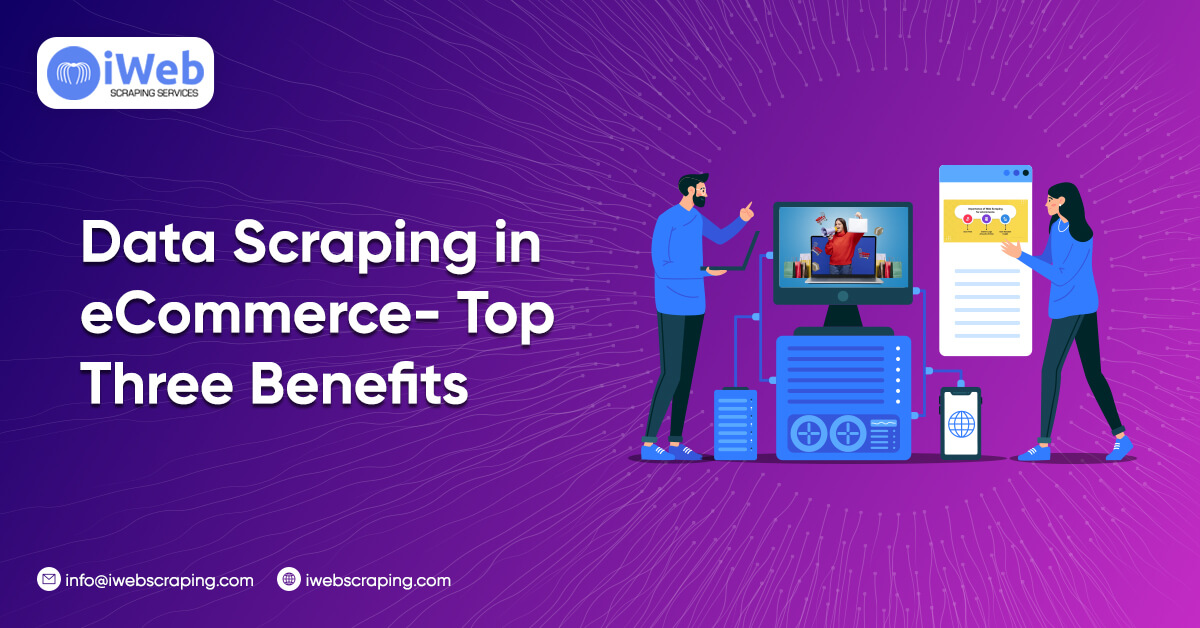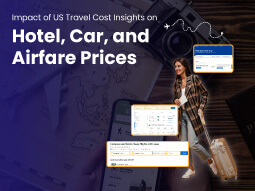Data Scraping in eCommerce- Top Three Benefits

In the last few years, the number of people using eCommerce has grown by leaps and bounds.
The number of people who buy things online is going through the roof, and by 2026, 24 percent of all retail transactions are expected to be made online. With numbers like these, it's clear that businesses can't afford to be online today. But as eCommerce becomes increasingly important, the competition is getting stronger.
Even small and medium-sized eCommerce businesses just starting need help to do well.
Businesses must use all the tools to beat the competition and stand out in online shopping. Out of all the different tools, data stands out. Since data is the "oil" of the 21st century, it's essential to use it well to stand out in eCommerce. The best way to use info is to "scrape" it from the web through an ecommerce scraper API. What is going on? Let us find out!
All You Should Know About Web Scraping
Large amounts of data are automatically taken from websites by scraping or mining. Most of the data is in an HTML format, which is unstructured. This data is then turned into ordered data in a spreadsheet or a database. Different things are done with the information that has been handled. Web scraping is a way to get data from websites by using online services like APIs, writing your code, using third-party tools, etc. Web scraping is a legal way to get information from websites open to the public. The catch is that you can't steal private information, which could be against the law.
What is E-commerce Web Scraping?
Like web scraping in general, eCommerce pulls data from the eCommerce section. For example, eCommerce web scraping is a must-have tool to find out everything you can about the products and services on a competitor's website. It can also offer related benefits of ecommerce scraper API. The best thing about eCommerce web scraping is that it is automated, and you don't have to spend hours physically copying and pasting data.
Top Three Reasons Web Scraping is Necessary for eCommerce Sites
Web scraping can help eCommerce sites in important ways. As an online store, you can't ignore the "tour de force" that data harvesting is today if you want to stay in business.
1. Price Monitoring
Price is the most important thing affecting a buyer's interest and buying choice. Studies show that price is the most important thing for more than 85% of online shoppers. After price, shipping cost and speed of delivery are the next most important things. The main point is that a possible customer won't even think twice about leaving your store if your prices aren't what they hoped for.
When things are this tough, the benefits of ecommerce scraper API through data harvesting take the lead. Online business owners need an eCommerce data scraping tool to get price information from rival sites. If you don't compare prices, acquiring new customers for your shop will be harder. Also, the average consumer can use various tools to compare prices across similar internet stores. So, changing the price of your product is important if you want to attract customers who care about prices and make your business more profitable.
2. Competitor Analysis
It's important to stay ahead of your eCommerce competitors these days, and the best way to do that is through competitor research. For example, 56% of online sellers offer free shipping, no matter how much the item costs or what it is. Many online stores use complimentary shipping to attract the customers they want. For example, a consumer's mind works to make them more likely to buy a product for USD 100 with free shipping than if it costs USD 90 plus USD 10 for shipping.
So, if you run an eCommerce business, you can use information from competitor sites to find out how many of your biggest rivals offer free shipping. With a new data scraping tool, it is possible to get real-time shipping data and look at it. For example, if some of your competitors don't give free shipping, you can bring in more customers by doing so.
3. Understanding Customer Aspirations and Needs
The customer is the undisputed king of eCommerce in the 21st century. If you know how your target customers feel about your goods, their prices, discounts, shipping policies, etc., you can make better decisions and do more to make your customers happy. By using eCommerce data scraping tools, you can find out what your customers want in a very useful way.
You can scrape customer reviews from your competitors' websites open to the public and then analyze them to learn more about their needs, wants, and goals. Even though customer feedback is usually spread across comments, testimonials, conversations, and reviews, automatic data scraping ensures you have all the information you need and can look at it in a streamlined way.
Top eCommerce Web Scraping Tools and How They Are Used

Now that we know why web scraping is so important for eCommerce sites, let's quickly look at the different tools you can use.
1. Octopasre
Octoparse is a free eCommerce data scraper known for being easy to use and having a great point-and-click interface. Octoparse works with Windows and Mac and can pull info from any eCommerce site you want. The best thing about it is that it has an auto-detect algorithm, which means you can get a lot of information out of it in seconds, even if you don't know how to code
2. Diffbot:
Diffbot is a reliable web scraping tool that can be used to gather a wide range of eCommerce data. It is correct, exact, and priced reasonably. The best thing about Diffbot is that you can get information from any website, no matter what language it is written in. It also comes with car APIs that make it easy to get data.
3. Parsehub:
Parsehub is a well-known eCommerce site scraper that can deal with JavaScript, AJAX, cookies, sessions, and redirects. It works with apps with one page, apps with more than one page, and another current tech. Parsehub can be used on both Windows and Mac computers.
4. iWeb Scraping
iWeb is a trusted name in the world of web scraping, renowned for its comprehensive and customized solutions. With years of experience and a team of skilled professionals, it is committed to delivering the highest quality services to its clients.
Conclusion
Now we have a clear picture of why eCommerce web scraping is important. The benefits of ecommerce scraper API, analyzing competitors, and meeting customer want are just a few of the many benefits of data harvesting for eCommerce sites.




